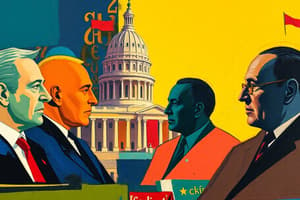Podcast
Questions and Answers
What is the definition of Democracy?
What is the definition of Democracy?
- A form of government by popular participation in the allocation of values in a society. (correct)
- An approach to describe society focusing on the few with power.
- A petition for an election to remove an official from office.
- A political model that views power as concentrated in the hands of few.
What is the term for the few in any organization/society who have power?
What is the term for the few in any organization/society who have power?
Elites
What does elite distemper refer to?
What does elite distemper refer to?
The condition when elites act in a self-serving manner, weakening faith in democracy.
What approach does elite theory (elitism) describe?
What approach does elite theory (elitism) describe?
What does equality before the law signify?
What does equality before the law signify?
What is the concept of equality of opportunity?
What is the concept of equality of opportunity?
What is the initiative in political terms?
What is the initiative in political terms?
What does the Iron Law of Oligarchy state?
What does the Iron Law of Oligarchy state?
Who are referred to as the masses?
Who are referred to as the masses?
What is the Plural Elite Model?
What is the Plural Elite Model?
What does pluralism in politics mean?
What does pluralism in politics mean?
What is the definition of power?
What is the definition of power?
What does recall mean in a political context?
What does recall mean in a political context?
What is a referendum?
What is a referendum?
What is relative autonomy of elites?
What is relative autonomy of elites?
What does the ruling elite model suggest?
What does the ruling elite model suggest?
What were the Articles of Confederation?
What were the Articles of Confederation?
What do checks and balances refer to?
What do checks and balances refer to?
What is classical conservatism?
What is classical conservatism?
What does classical liberalism promote?
What does classical liberalism promote?
What is common law?
What is common law?
What was the Connecticut Compromise?
What was the Connecticut Compromise?
Flashcards are hidden until you start studying
Study Notes
Key Concepts in Political Science: Elite Theory
-
Democracy: A system of government where power is derived from the participation of the populace in value allocation within a society.
-
Elites: A small, influential group within any organization or society that possesses considerable power.
-
Elite Distemper: A state where elites act in self-interest, undermining trust in the democratic process.
-
Elite Theory (Elitism): A perspective that emphasizes the roles, behavior, and demographics of the elite minority in society.
-
Equality Before the Law: The principle that the law should impartially treat all individuals, regardless of their social status, economic background, beliefs, or race.
-
Equality of Opportunity: The belief that every individual should have a fair chance to fully develop their abilities in all life aspects, including social, economic, political, and educational spheres.
-
Initiative: A mechanism allowing voters to propose legislation through a petition, enabling them to place issues on the ballot without legislative approval.
-
Iron Law of Oligarchy: A foundational theory in political science asserting that elite groups will emerge in any societal structure, regardless of its size or nature.
-
Masses: The larger group within an organization that lacks power compared to the elite.
-
Plural Elite Model: A framework that suggests power is widely distributed across leadership groups that represent diverse societal segments, responsible to the electorate through competition and accountability.
-
Pluralism: The notion that democracy thrives in a political landscape where competing elites shape public policy through negotiation and compromise, while voters can make meaningful electoral choices.
-
Power: Defined as the capacity to direct influence over people or events by controlling valuable resources.
-
Recall: A procedure allowing voters to petition for a vote on whether an incumbent should be removed from office before their term ends.
-
Referendum: A voting process where the electorate must approve legislative decisions before they become law or constitutional amendments.
-
Relative Autonomy of Elites: The idea that different elite groups operate independently to pursue their own specific interests.
-
Ruling Elite Model: A political structure where decision-making power is predominantly held by a small elite, with minimal influence from the masses.
-
Articles of Confederation: The first constitution of the United States, which established a loose alliance of independent states from 1781 to 1789.
-
Checks and Balances: A governance principle that distributes power among various government branches, requiring consensus to limit corruption.
-
Classical Conservatism: A worldview emphasizing tradition and the flawed nature of humanity, which necessitates political structures to prevent potential failures.
-
Classical Liberalism: An ideology based on a social contract formed by rational individuals who sacrifice some freedoms for enhanced security.
-
Common Law: The British legal system founded on historical precedents rather than solely contemporary legislation.
-
Connecticut Compromise: An agreement during the U.S. Constitution formulation ensuring equal state representation in the Senate and population-based representation in the House of Representatives.
-
Judicial Review: The judicial system's authority to review and invalidate legislation or executive actions that are unconstitutional.
Studying That Suits You
Use AI to generate personalized quizzes and flashcards to suit your learning preferences.




